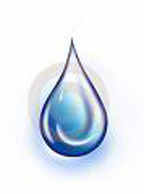
Changing weather patterns and dwindling shared river waters have sounded alarm bells in Los Angeles, population 10 million, where the city council sent a rationing plan for further study. Higher water rates are under consideration as well as the reclamation of sewage water for human consumption.
Surprisingly perhaps, 97% of the world's fresh water is in underground storage areas called aquifers, many millions of years old. One aquifer in eastern China provides drinking water to 160 million people. A huge aquifer in Midwest U.S. that has irrigated most of the nation's fruit and vegetables production is now in danger of being depleted from overuse.
Water tables are falling, often several metres a year, and pumps are drilled often a kilometre or more to find water in food producing areas in China, India, the US, Afghanistan, Iran, Israel and Mexico. The demands of growing global population and the “needs” of industry and modern agriculture are enormous. Contamination of water tables is a huge problem in some locales.
Few people in the industrialized world take the crisis seriously or understand how directly it threatens them and other beings.
“The environment is part of every individual and each of us is part of the environment.”
Water in its many forms, liquid, solid, gas – whether as clouds, rivers, lakes or as invisible water vapour, sustains physical and inner life.
Our body is about 60% water; each of us is part of the world's water. Water is not just a commodity like a teapot; it is life itself. Our attention to the sources and wise use of this gift are crucial to our well-being. “The water crisis is an expression of the environmental catastrophe of human over-exploitation”, says Paul Crutzen, Nobel Prize winning chemist.
What we have is not a water crisis, per se, but a human crisis requiring the application of both science and technology, and the virtues of caring, simplicity, ethical and spiritual sensitivity, communal solidarity, intelligence and persistence - qualities as great as economic security in a darkening age.